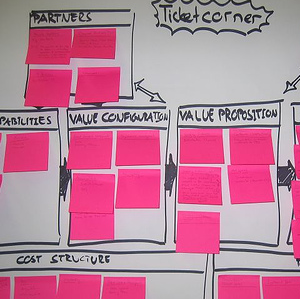Entrepreneurship
discount airfare guide, marketing lesson, price, pricing, value
I have survived as an entrepreneur for 10 years not because I am inherently good at most aspects of running a business. I am a terrible salesperson, I get bored easily, I don't like busy-work or higher math, and I have the classic ADD personality.
None of this is tremendously helpful in business, and in a lot of ways, it's made things more difficult than they are for other, more balanced people.
Instead, I trace my success at survival to two key skills: first, I am a decent copywriter. Writing well really does help you do a lot of things. Second, I have a fairly good understanding of the twin concepts of price and value.
There are some other "life skills" that are also important -- notably, persistence -- but in terms of specific business skills, that's pretty much all I've got. And for the most part, it works just fine, if a bit haphazard at times.
Today I thought I'd tell you about the second skill of understanding price and value, and I'll do so with a real-life case study from the launch of my first AONC product. I'll tell you what I did wrong, what worked well, and why I chose to market the product the way I did.
Ready?
First, all understanding about the whole subject of pricing comes from one critical principle:
Whenever we spend any amount of money, we undertake a complex, emotional analysis of price and value.
This process is hard to overstate, and few of us are immune. In fact, it is pretty difficult to buy much of anything without going through the process. It's often subtle or even subconscious, but it's definitely real. We often have expectations for how much something should cost, and when our expectations are unmet, we respond with emotion.
- BAD Feeling (skepticism, uncertainty) - "Wow, that's so expensive. Is it really worth it?"
- GOOD Feeling (happiness, fulfillment)
- "Wow, it's on sale! I'm getting a great deal!"
These feelings are not always rational -- have you ever known someone who will drive 30 miles to save a couple dollars? Or someone who uses coupons to buy products they don't like?
Like I said, our expectations of value are not entirely rational, but they are very real nonetheless. From a $4 latte to an $8 movie to a $15,000 car, we evaluate purchases based on the expected emotional benefit in exchange for the money we give up to receive it.
When we go to Starbucks, we complain about the $4 latte... but then we go back the next day or next week. Apparently, the latte is worth the price even though we feel a little guilty about the $4.
There is a lot to this - the great book Influence covers the topic in far more detail.
The important thing to understand is that buying something is not simple. There's a lot going on, and that's why it's critically important for businesses to get the pricing right.
If you price something too high, you alienate buyers. People will kick the tires, but most of them won't take the car off the lot without more persuasive selling. That may seem fairly obvious, but the opposite is true as well.
If it's priced too low, this is also a big mistake, because perceived value is directly related to price. People are skeptical of advice on the cheap. Free is good, and reasonable-to-expensive is good, but cheap is bad.
What if you heard about a consultant who works for $9 an hour, would you think, "Wow, what a deal?" I suspect that most people would think, "Wow, they must not be very good."
Again, this may not reflect reality -- perhaps there's an awesome consultant out there who just likes pricing at the low-end -- but true or not, it reflects how we perceive value. When you hear about a $300 an hour consultant, you might not be able to hire her, but you usually respect her. The perception is that a $300 an hour consultant is much better than a $9 an hour consultant.
For another example, say you walked into Best Buy and saw a $99 iPod killer on the shelf. Would you buy it right away?
I suspect not. You'd automatically think it couldn't possibly be as good as a real iPod. You'd be very suspicious, because you expect iPods and even iPod knockoffs to be more expensive because they're worth more.
Those are somewhat hypothetical examples, but you get the idea. Let's take a look at a real-life, recent, highly-personal example.
 The UGDA Case Study
The UGDA Case Study
As many of you know, last week I released my first commercial product, the Unconventional Guide to Discount Airfare. This was definitely a labor of love and an emotional investment for me, because I've spent a lot of time working on the AONC site and building an audience over the past five months.
For anyone who believes that bloggers shouldn't sell things, let me assure you that there are a lot easier ways to make money. But on the other hand, I passionately believe that artists should be allowed to make money. (I wrote that post in part to preempt complaints about creating an online shop in addition to my free essays and other content.)
Since I've been an online entrepreneur for ten years, I'm not normally indecisive with pricing. I can usually look at something and know fairly quickly how much it should cost. But since this was a new market and my first "branded" product, I was a little nervous.
Before the launch, I sent off some emails to people I know and trust to get their advice on pricing. Unfortunately, there was no consensus.
My internet marketing friends, who sell ebooks every day for $67, $79, or $97, took a look at the guide and said I should price at $49. "Look at what you are giving people," said one.
"You're telling them how to get access to airline lounges, the truth and lies about upgrades, how to get elite status without flying, and on and on. This is worth hundreds of dollars."
Yes, that's all true. But I felt uncomfortable pricing at the $49 point -- I really wanted it to be more accessible. On the other hand, a few other respected experts said I should price lower than I expected.
$14.95, said one. $18 max, said another.
Yikes - I was equally uncomfortable with that idea. There is real value in the information I provide, and if I was selling it on the cheap, I'd rather just give it away. I'm not a mass-marketer; this is a niche product, and the average airfare costs $413 in North America. If someone can't afford $25, I don't mean to be insensitive, but they probably don't do much flying.
Thus, I had to make my own decision, and as much as I dislike the middle ground, that's what I went for - $24.97. I might sell more copies at a rock-bottom price point, and I might make more money selling at a higher price, but such is life with pricing decisions. You just have to make a decision and see how people respond.
So, how was the response?
Well, I won't be retiring to Monaco anytime soon, nor can I rely on this as anything close to a full-time income... but I think I have the potential to build a nice little business over the next year.
There were a couple people who complained about the price, and a couple people who said after reading the guide that they gladly would have paid more. I can live with that kind of healthy tension.
Oh, by the way - social proof is another important part of the price and value correlation. We'll have to cover this later, but in short, social proof is the public display of what other people think about your work.
Here are the early reviews, from real-life people:
I feel like I’ve stolen the book for that price. Well worth the investment. -Elliot Webb
And here's another, from Naomi who writes from Ontario over at Ittybiz:
"While I admit it takes a shotgun to my head or a hefty handful of Xanax to get me on an airplane -- I seriously considered taking a boat to Bali for my honeymoon -- sometimes it has to be done. This book actually makes flying seem kind of fun. Very informative, value packed, no fluff. The guide to airport lounges alone was worth the cover price. If you don't save money after reading this book you are quite frankly too stupid to be allowed on a plane without a chaperone."
(You may have noticed that Naomi is quite a direct person. Don't be offended. She's a friend.)
I have a lot more feedback like that, and I'll publish some of it on the product page over the next week or two. Elliot wrote his note to me at the same time someone else (who did not purchase) sent me a long rant telling me how expensive the guide was and how I was doing a disservice to the world, all marketing an evil, etc. I appreciated reading Elliot's note right after hearing from the unhappy person.
Despite the fact that the launch went well, there's always a few things you can learn from any success.
Here's my list of what-to-do-better in the future:
- I should have included a 2-page sample.
Someone said that they would like to know more about what they are getting. You guys are correct, and I've fixed that. Here's the sample. The sample is representative of the practical information included on each page of the guide.
- The length could have been extended.
This is the ultimate pricing paradox, and I've thought a lot about it. I've bought a few dozen ebooks over the years, and about half of them have cost me $49 or more. Almost all have provided good value, but almost all have been a bit too long for my taste.
There is inevitably a lot of good content but also a lot of fluff in the average ebook, and I wanted to avoid that with mine. I focused entirely on practical strategies and tactics, and left the fluff out. (There's no blank pages for notes, for example, or long checklists that take up extra pages.)
However... I now realize that some people decide on value based on a price-per-page basis.
If you think about it, this is highly irrational. If someone drew you a treasure map, would you worry that it was only on one page? But as noted previously, most purchase decisions involve more emotion than rationality. Thus, even though I offer free lifetime updates and will be adding more to the guide in the future, I probably should have had a few extra pages in there. Point noted.
- Lastly, I couldn't do it this time, but in the future we'll do a better job with segmentation.
I got emails from the U.K. and Australia asking for localized versions. I got emails asking for a higher-priced, higher-end version for business travelers most interested in flying First Class. I got emails from India and elsewhere asking for a bare-bones (but cheaper) version.
We're working on these ideas. I have to find the right balance there (i.e., I don't want 10 different guides for the same subject), but it's on my mind. For now, I have a makeshift solution for those international readers who are interested. If you're one of them, write me and I'll give you the details.
For the next guide, I'll take each of these lessons to heart and see how to make it even better. I'm working on it already, but it won't be coming out for a while. Like the first one, it's better to do it right than to do it quickly.
***
Getting Back to Basics
There's no way to eliminate the emotional process of buying something, but I recommend taking the process into the open. Asking serious value questions - not "What color is it?" or "How many pages is it?" but "How will this improve my life?" helps reduce the tension and ensure better choices. Another good question is, "Do I value this item (or service) more than I value the x dollars it will cost me?"
When I started thinking more about this, I started making different life choices. I made my decision to visit 100 countries by thinking about price and value. I entered and completed a Master's Degree program by thinking about price and value... but then I turned down a Ph.D. program by thinking about the same thing. It wasn't the right time for me.
Your mileage, as they say, will vary. You might not do the same things or make the same choices - in fact, I hope you'll do whatever it is you want to - but when you think carefully about price and value when buying (or selling), you'll usually make wiser decisions.
Good luck out there.
###
RSS Feed | Email Updates | A Brief Guide To World Domination |
The Unconventional Guide to Discount Airfare
Did you enjoy this article? Please pass it on to others at your favorite social networking site, or share your own thoughts in the comments section.
Read More
















